farm
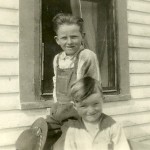 Opinions vary on the matter of child labor, and who can legally have their child work and at what kind of job. Some people take it to the point of saying that children shouldn’t even do chores around the home, which is, in my opinion, silly. It is my thought that children need to be helping out around the house, but beyond that I suppose the water gets a little bit murky. In the distant past, children were farmed out to spend their days working at a job that should have been done by an adult, and the kids really had no childhood to speak of. That is cruel treatment, and the current child labor laws prevent that from happening…unless people are so illegal that they do it without the knowledge of the government.
Opinions vary on the matter of child labor, and who can legally have their child work and at what kind of job. Some people take it to the point of saying that children shouldn’t even do chores around the home, which is, in my opinion, silly. It is my thought that children need to be helping out around the house, but beyond that I suppose the water gets a little bit murky. In the distant past, children were farmed out to spend their days working at a job that should have been done by an adult, and the kids really had no childhood to speak of. That is cruel treatment, and the current child labor laws prevent that from happening…unless people are so illegal that they do it without the knowledge of the government.
That said, there is a group of kids…even today that do work every day, and it is not illegal at all. These are the children of farmers and ranchers. I don’t know of any of those kids who don’t help out around the farm or ranch. There are stables to be cleaned, and cows to be milked, and animals to feed. There are also crops to be cared for and planted. These kids work and there is nothing illegal about it. Of course, their parents do have to 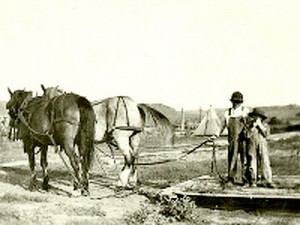 be careful on a few matters. The children must get their schooling, and they have to be working on the parents farm or ranch.
be careful on a few matters. The children must get their schooling, and they have to be working on the parents farm or ranch.
Such was the case for my husband’s great uncles and his grandfather. Many people owned farms when those boys were young, and the kids helped out with just about everything. Most families back then really couldn’t afford to hire the amount of workers that it would take to run the place, so they hired what they had to, and the kids learned to work. I really can’t say that I think this is a bad thing. The kids often like the work…especially taking care of horses…since they often get to ride them too.
If you look back on the lives of our parents and grandparents, you will find that many of them grew up on a farm or ranch, and most of them were working to help out on the place at a very young age. Really, what a wonderful way to bond with the parents. Running a ranch or farm is a big job, and most kids like to do the things their parents are doing, because they want to be just like their parents. If a child is interested in doing the same kind of work their parents do, or take over the family farm, they need to know how to do this from the bottom up. What better way could there be, than to help out as a child.
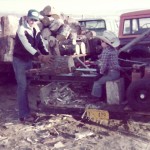
Of course, not every family owns a farm or ranch, and while they may live in the country, they don’t have that kind of work to do. Still, the kids can and should help out with things. My nephew, Barry Schulenberg, loved helping his grandpa split firewood. He ran the splitter while his grandpa loaded the wood into it. Barry was about 4 years old, but you couldn’t have pulled him away from that job for anything. He was the one who did that, and that was all there was to it. Maybe some people would think he was a bit young, but there was never a single accident when he worked the splitter. I think sometimes we don’t give these kids enough credt. They can often do more than we think they can. They just need to be given a chance.
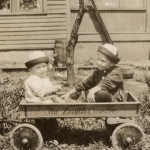 When I look at the pictures of my dad and his brother, my Uncle Bill, I can see how much they loved each other. They may have tried to look tough, but there was a lot of brotherly love between them. They were best friends, playmates, but most of all brothers. The way Uncle Bill took care of his little brother, and the way my dad looked up to his big brother…you could see it in their eyes. They were the two middle children with their older sister Laura, being ten years older than Uncle Bill, and their sister, Ruth being 2 years younger than my dad. Because they were together and just the two of them, except for their sister, Laura’s care, and because Ruth was too little to play for a couple of years, the boys were very close….like a lot of brothers are.
When I look at the pictures of my dad and his brother, my Uncle Bill, I can see how much they loved each other. They may have tried to look tough, but there was a lot of brotherly love between them. They were best friends, playmates, but most of all brothers. The way Uncle Bill took care of his little brother, and the way my dad looked up to his big brother…you could see it in their eyes. They were the two middle children with their older sister Laura, being ten years older than Uncle Bill, and their sister, Ruth being 2 years younger than my dad. Because they were together and just the two of them, except for their sister, Laura’s care, and because Ruth was too little to play for a couple of years, the boys were very close….like a lot of brothers are.
Through their young years, the boys worked together on the farm, and in several other work ideas they came up with. They shared a love for guns, dynamite, and cars…you know, the usual guy stuff. I know that when their little sister, Ruth came on the scene they were good 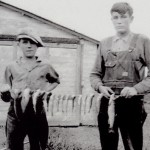 friends with her too, and she was most likely a tomboy because of them…a matter of self defense, if you know what I mean. Because Aunt Laura was so much older than the rest of the children, I think they must have looked to her as more of a babysitter than a playmate…although she was great when it came to being pulled around on a sled or in the wagon.
friends with her too, and she was most likely a tomboy because of them…a matter of self defense, if you know what I mean. Because Aunt Laura was so much older than the rest of the children, I think they must have looked to her as more of a babysitter than a playmate…although she was great when it came to being pulled around on a sled or in the wagon.
As they grew up, they took several trips together to go work the harvest in North Dakota, among other things. I’m sure they had a great time just hanging out together, and finding work and places to stay was fun and challenging. They had an especially challenging time on one trip, when the only place to stay was at the local jail. I’m sure that was a bit odd for both of them. They had to be treated the same as any other prisoner. They took all their belongings, and searched them, and had to know all about their background, but they let them stay on the bunks covered with strips of steel and cardboard…not particularly comfortable, but the place was warm and dry, so they were grateful.
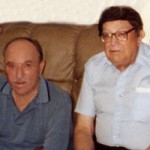
On their last visit together, my dad was not in good health. We weren’t sure the brothers would ever get to be together again, but my cousin Bill Spencer and his family made the trip so that we could make it happen. It was such a sweet reunion for them. They talked a lot, played cards, and in general, just spent time together. We were all so grateful to Bill for bring his dad, my Uncle Bill out so they could have one last visit. My dad passed away in 2007, and thankfully Uncle Bill has dementia, so that is something he doesn’t have to know. The miles between them make it possible to keep him in the dark a bit, because I know it would be very sad for him to know that, and sad for us to tell him.
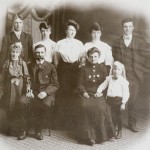 Recently, I received an email on my Ancestry account. It was from a woman named Laura Weber. Through her husband’s DNA, she was able to connect him to the Spencer side of our family, and this brings the family connections to another fork in the road. It seems that Laura’s husband, Nicholas is a descendent of Clifford Spencer, who is the son of William Spencer and Viola Fuller, and is my grandfather, Allen Luther Spencer’s younger brother. Clifford first married a woman named Annie, and they had a daughter named Ethyl Pearl. They were divorced, and he married a woman named Hanna, and they had three children, Loraine, Clifford, and Wanda.
Recently, I received an email on my Ancestry account. It was from a woman named Laura Weber. Through her husband’s DNA, she was able to connect him to the Spencer side of our family, and this brings the family connections to another fork in the road. It seems that Laura’s husband, Nicholas is a descendent of Clifford Spencer, who is the son of William Spencer and Viola Fuller, and is my grandfather, Allen Luther Spencer’s younger brother. Clifford first married a woman named Annie, and they had a daughter named Ethyl Pearl. They were divorced, and he married a woman named Hanna, and they had three children, Loraine, Clifford, and Wanda.
Ethyl Pearl always felt very much alone after her dad left, and while she grew up around her mother’s family, she never really got over losing her dad. She married a man named Claude Coleman, and they had six children, Joyce, Duane, Laura, Claude Jr, Alfred, and Lois. Her husband was not the staying kind either, and in the end, I think it might have been for the best, or at least as far as my Uncle Bill was concerned. For part of their your life, the Coleman children lived with my grandmother, Anna Schumacher Spencer, and the children went to school and helped out on the farm. It was a good life, but like their mother, they missed their dad…no matter what the circumstances of his departure.
Ethyl’s daughter, Lois married a man named Weber. He and Lois had three biological sons, and one adopted daughter. One son, Peter passed away in 1981, and their adopted daughter, 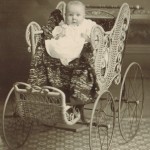 Terry passed away in 2008. The sons who are still alive are Mark and Joe. Mark married a woman named Margaret Mason. They had Nicholas (Nick), and then divorced. It is Nick’s wife, Laura, who made the connection with me, and we are both very excited about this new connection.
Terry passed away in 2008. The sons who are still alive are Mark and Joe. Mark married a woman named Margaret Mason. They had Nicholas (Nick), and then divorced. It is Nick’s wife, Laura, who made the connection with me, and we are both very excited about this new connection.
It is so amazing to me to be able to connect with yet another branch of the family. I hope to have some pictures of Lois in the future, as well as possible introduce the Weber’s to the rest of the family. I have been so excited about the family members I have found through the DNA I sent in to Ancestry. It has opened so many new doors, and there will be more in the future.
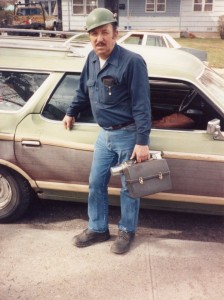 My dad was a hard working man, really from the time he was a kid. He helped out on the farm when he was a young man, then when he moved to California at 17 years of age, he did the work of a grown man, while he was still the age of a boy. That work ethic was something he learned growing up and it never left him. Through World War II and beyond as he moved around the country, while deciding where he wanted to live, he always had a job. He believed that work, any kind of work was a noble undertaking, and he did every job to the best of his ability.
My dad was a hard working man, really from the time he was a kid. He helped out on the farm when he was a young man, then when he moved to California at 17 years of age, he did the work of a grown man, while he was still the age of a boy. That work ethic was something he learned growing up and it never left him. Through World War II and beyond as he moved around the country, while deciding where he wanted to live, he always had a job. He believed that work, any kind of work was a noble undertaking, and he did every job to the best of his ability.
When I was a little girl, he was working at a job that took him out of town sometimes. I really hated that particular job. I didn’t want my daddy to leave to go out of town all the time. It wasn’t that I was so young that I didn’t remember him when he got back, because I did, it was that I missed him so much that I could hardly stand it. I just didn’t think daddies should go out of town. He was supposed to be at home, with his family. I can’t say that the years have changed my opinion on that idea either, although I do understand that sometimes men have to go out of town for work. That is just the way things are sometimes. I just didn’t understand that as a child.
One time after Dad left to go out of town, I got sick. My stomach ached, and I just didn’t feel well, in general. Mom put me to bed and took care of me, as you would expect a mommy to do, and since it was nothing serious, there was no need to go to the doctor. We figured it was just a flu bug, and it would go away in a couple of days…and so it did, but not in the way you would expect. It was the strangest thing, but the minute my daddy got home, everything was fine, and I had not been faking illness either. This was similar, I suppose to being homesick, 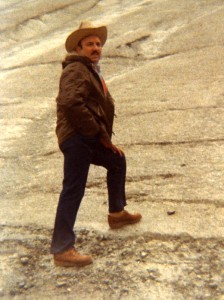 only in reverse. I wanted my daddy home so badly that I felt homesick for him. I was so happy when he came home. Everything was right again. Our family was all together again.
only in reverse. I wanted my daddy home so badly that I felt homesick for him. I was so happy when he came home. Everything was right again. Our family was all together again.
Dad was always the hero to his daughters. We knew that no matter what happened, Dad could fix it. That was just the way it always was. Dad was a problem solver, and his presence in our lives always made us feel stable and complete. We were always Daddy’s Girls…all of us, including Mom. And he always made us feel like we were his princesses. I guess that was why having him gone, out of town for work, or now, in Heaven, makes this world feel like something just isn’t right. And it isn’t, because my daddy isn’t here, and I miss him terribly. Today, my dad would have been 90 years old. Happy birthday in Heaven Dad. We love and miss you very much, and we can’t wait to see you again.
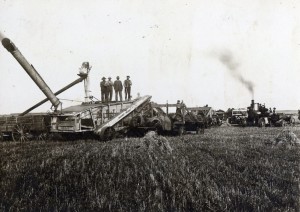 Farm work in years gone by, was a much harder job than it is these days, but with the invention of machinery, things got easier. Still, most people couldn’t afford to own those machines in the early years, so they either did the work by hand, or hired the threshers to come and do it. Soon, most farmers were hiring the threshers to come. It was a lucrative business for someone who had enough money to buy a machine…or better yet, several. I know that those members of my family, who were farmers, did hire the threshers, or else, they had enough money to buy their own machines, but I have to think that most people in those early years did not think the machine was a good value, if a man was going to just use it on their own farm, so the work was mostly hired out.
Farm work in years gone by, was a much harder job than it is these days, but with the invention of machinery, things got easier. Still, most people couldn’t afford to own those machines in the early years, so they either did the work by hand, or hired the threshers to come and do it. Soon, most farmers were hiring the threshers to come. It was a lucrative business for someone who had enough money to buy a machine…or better yet, several. I know that those members of my family, who were farmers, did hire the threshers, or else, they had enough money to buy their own machines, but I have to think that most people in those early years did not think the machine was a good value, if a man was going to just use it on their own farm, so the work was mostly hired out.
When the threshers were scheduled to come to your farm, it was a big day. The women would get up early and start cooking for the men, who would be very hungry by lunch time. 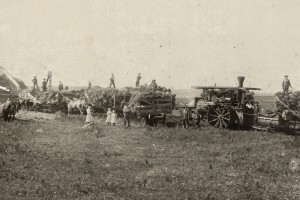 This was heavy work, even with the help of the machinery. Nevertheless, everyone was excited when the threshers came…from the adults to the little kids. I’m sure that being able to watch the big machines working was a novel thing in those early years, and nobody wanted to miss out. Not only that, but everyone wanted to get their picture taken with the workers too, so that they could say they had been there when they were working. It was almost like having a celebrity visit your house, I suppose. It is a day like no other in the year. Everyone wants to be in on all the excitement, and it’s hard to keep the little kids out of the way. Nevertheless, they had to stay out of the way, because the huge machines were also dangerous and could easily kill a small child.
This was heavy work, even with the help of the machinery. Nevertheless, everyone was excited when the threshers came…from the adults to the little kids. I’m sure that being able to watch the big machines working was a novel thing in those early years, and nobody wanted to miss out. Not only that, but everyone wanted to get their picture taken with the workers too, so that they could say they had been there when they were working. It was almost like having a celebrity visit your house, I suppose. It is a day like no other in the year. Everyone wants to be in on all the excitement, and it’s hard to keep the little kids out of the way. Nevertheless, they had to stay out of the way, because the huge machines were also dangerous and could easily kill a small child.
With the excitement, however, comes hard work. When the threshers are done. The grain had to be bagged for storage or sale, and the straw stacked for use in the barns. Nevertheless, it took a lot less workers to harvest the crops, and many farm laborers were not happy about that, because they faced the loss of their jobs. I suppose that with every bit of progress 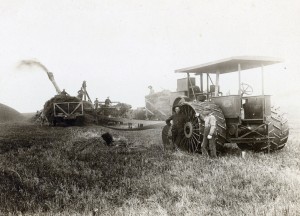 designed to make our lives easier, comes the possibility of job loss. Every time a machine takes over the hard labor, a worker becomes unnecessary. People have to adapt and change, educating themselves to run the equipment so they can move into a job that takes more skill, and thus creates job security. I know that for the farmer, the machines were the best thing to come along. The wages they didn’t have to pay out to the laborers added up to pure profit for them, even with the cost of the threshers. It was a new era, and things would never be the same again.
designed to make our lives easier, comes the possibility of job loss. Every time a machine takes over the hard labor, a worker becomes unnecessary. People have to adapt and change, educating themselves to run the equipment so they can move into a job that takes more skill, and thus creates job security. I know that for the farmer, the machines were the best thing to come along. The wages they didn’t have to pay out to the laborers added up to pure profit for them, even with the cost of the threshers. It was a new era, and things would never be the same again.
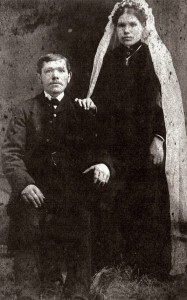 My great grandfather, Carl Ludwig Theodor Schumacher, was born in the Province of Pommern in northern Germany, on May 23, 1859. He was one of the twelve children of Johann Freidrich Theodor Schumacher and Maria Maehling. He came to America after taking care of a wealthy landowners driving horses for several years beginning when he was 15. It was a job he loved very much, because he really loved horses. By the spring of 1884, he had saved enough money to pay for passage to America, with the plan of moving to Minnesota, where he had cousins.
My great grandfather, Carl Ludwig Theodor Schumacher, was born in the Province of Pommern in northern Germany, on May 23, 1859. He was one of the twelve children of Johann Freidrich Theodor Schumacher and Maria Maehling. He came to America after taking care of a wealthy landowners driving horses for several years beginning when he was 15. It was a job he loved very much, because he really loved horses. By the spring of 1884, he had saved enough money to pay for passage to America, with the plan of moving to Minnesota, where he had cousins.
Henriette Albertine Johanne Hensel was born in Schönwalde in the southern part of the Province of Pommern, in northern Germany on December 11, 1860. At the time she lived there all this land was part of the Prussian Empire. She was the second youngest of nine children of Carl Hensel and Henriette Tonn. Her father died before her younger brother was born in 1865. About that time, Henriette was sent to her older sister’s home to tend the 5 cows and 52 sheep she had. As time went on, she grew up and had a boyfriend…she was happy and content. Then everything changed for her. Her sister’s husband wanted to immigrate to America, and since Henriette was not married, her mother wanted her to go with them to help her with her two small daughters. She didn’t want to go, but she did go. The voyage was long, and the family spent much of it quite ill. Her sister’s husband never really recuperated fully, and he died just a few years later.
One Sunday a friend of Carl Schumacher’s asked him to sponsor at a baptism in his stead. At the baptism celebration, Carl met the mother of the baby, and her sister Henriette Hensel, who had both just recently come to America from Germany. For Carl, it was love at first sight, and he married the young lady just a year later in Belchester, Minnesota on November 12, 1886. Their marriage was blessed with seven children, Anna Louise (who became my grandmother), Albert August, Maria (who died at just three years of age), Mina Albertine, Frederick Carl, Bertha Emilie, and Elsa Ernestine.
About a year after Elsa was born, the family moved to a farm 12 miles from Lisbon, North Dakota. It was so different from Minnesota, and Albert, who was 15 at the time, fell in love with the wild country. In Minnesota he fished, but there was not much to hunt. Here there was lots to hunt, and guns quickly became Albert’s lifelong hobby. It was here, in 1910, that the family purchased their first surrey. It was a surrey with a fringed top. Anna married my grandfather, Allen Luther Spencer, then Albert married Christine Ida Froemke, and Mina was away at college in Fargo, finishing her high school. The neighbors started getting the new Model T car, and Albert had to have one, but Carl loved his horses, so he kept his surrey. Albert spent all of his spare time studying mechanics. Mina hated the farm, so Henriette wanted to make sure that her daughter received an education. In 1917, Henriette and Fred were both in bed with arthritis, but Henriette didn’t want Bertha to miss her senior year of high school, so she left her bed to care for Fred. After a few family meetings, they decided to leave Fred, who was feeling better now, to run the farm and the rest of the family moved to Fargo, North Dakota, where Carl and Henriette would spend the rest of their lives. Bertha graduated from Secretarial School and Elsa from high school. Mina married John Clark 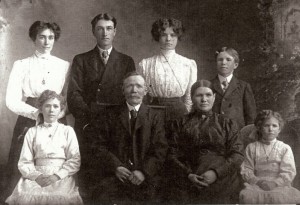 Spare. Bertha married Arthur C Hallgren and Elsa married Frank Lawrence. Bertha and Elsa would not have children of their own, but would “adopt” their niece, Pauline Spare Holmberg’s children, Lisa, John, Kristen, and Julie. Between the four remaining children, Carl and Henriette would receive twenty one grandchildren, and a growing number of great grandchildren, great great grandchildren, and these days, great great great grandchildren. All this from a chance meeting when Carl stood in the stead of a sponsor who was unable to be there for a baptism…wow!!
Spare. Bertha married Arthur C Hallgren and Elsa married Frank Lawrence. Bertha and Elsa would not have children of their own, but would “adopt” their niece, Pauline Spare Holmberg’s children, Lisa, John, Kristen, and Julie. Between the four remaining children, Carl and Henriette would receive twenty one grandchildren, and a growing number of great grandchildren, great great grandchildren, and these days, great great great grandchildren. All this from a chance meeting when Carl stood in the stead of a sponsor who was unable to be there for a baptism…wow!!
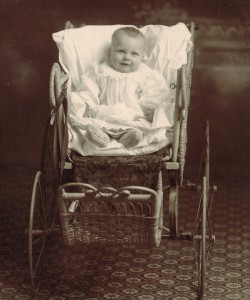 Sometimes, it seems, people are dealt a very sad hand in life. Such was the case for my 1st cousin once removed, Pearl Ethyl Spencer. She was the daughter on my Great Uncle Clifford Herbert Spencer and his wife at the time, Annie Mae Jordan. As sometimes happens in marriage, Clifford and Annie divorced when Pearl was just a baby, and he moved to Rushville, Nebraska, where he would remarry, to a woman named Hanna (who went by Anna, making the records somewhat confusing), have 3 more children, and live out the rest of his life. To my knowledge he either saw very little of, or nothing more of, his daughter Pearl. Then, when Pearl was still very young, her mother, Annie passed away, leaving Pearl a virtual orphan. My Great Aunt Bertha always said, “Poor Pearl, she was so terribly alone!” Pearl must have had some contact with her grandparents, my Great Grandpa William M
Sometimes, it seems, people are dealt a very sad hand in life. Such was the case for my 1st cousin once removed, Pearl Ethyl Spencer. She was the daughter on my Great Uncle Clifford Herbert Spencer and his wife at the time, Annie Mae Jordan. As sometimes happens in marriage, Clifford and Annie divorced when Pearl was just a baby, and he moved to Rushville, Nebraska, where he would remarry, to a woman named Hanna (who went by Anna, making the records somewhat confusing), have 3 more children, and live out the rest of his life. To my knowledge he either saw very little of, or nothing more of, his daughter Pearl. Then, when Pearl was still very young, her mother, Annie passed away, leaving Pearl a virtual orphan. My Great Aunt Bertha always said, “Poor Pearl, she was so terribly alone!” Pearl must have had some contact with her grandparents, my Great Grandpa William M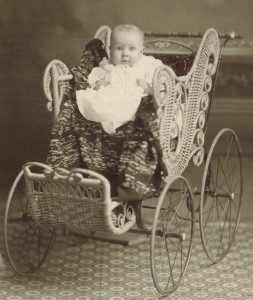 alrose Spencer I and Grandma Viola Fuller Spencer, because Aunt Bertha Spencer Hummer knew enough about her to say that her childhood was very lonely.
alrose Spencer I and Grandma Viola Fuller Spencer, because Aunt Bertha Spencer Hummer knew enough about her to say that her childhood was very lonely.
Pearl grew up and married Claude Lawrence Coleman, and together they had six children, before he too would leave her around 1941. I’m sure that by this time, her children were a blessing to her, and she was no longer as lonely, but Claude’s decision to leave the family must have struck quite a blow to poor Pearl. It was about this time that Pearl and her children came to live with my Grandma, Anna Schumacher Spencer, who was her great aunt. The two families became as one, living and working together during those hard times following divorce and during World War II. They were really a big help to my grandmother, since my dad was serving in the Army Air Forces in England, My Aunt Laura was married and on her own, and Uncle Bill lived in Superior, but worked in the shipyards. Aunt Ruth was still living at home, and prior to this time, they ran the farm together, but it was hard work, and I’m sure the extra help was 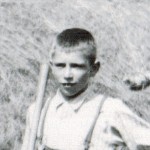 very nice.
very nice.
Pearl’s son Claude was a hard working boy, who worked side by side with my grandmother on the farm, and his sisters helped out where needed too. Pearl’s life took many sad and difficult turns, but she raised very nice children. In later years, my Uncle Bill lost touch with Pearl, and to my knowledge never saw her again, but he reconnected with Claude in the late 1990’s, and in 2000, he sent him copies of the only pictures he had of his mother, Pearl. While the letter telling of Pearls history is a sad one, I’m sure that Claude was very pleased to get the two pictures of his mom.
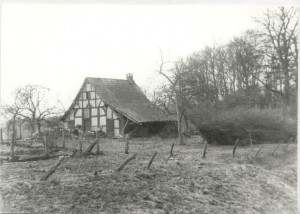 Most of us can trace our roots back to certain people and even certain regions, but not everyone can trace their roots back to a certain house that our ancestor owned in 1628. I can’t say if Johann Schulenberg built the home on the farm, as did my ancestor in the case of, my cousin Princess Diana’s family’s home, Althorpe in England, which has been owned by her family since it was built by Robert Spencer the 2nd Earl of Sunderland in 1688.
Most of us can trace our roots back to certain people and even certain regions, but not everyone can trace their roots back to a certain house that our ancestor owned in 1628. I can’t say if Johann Schulenberg built the home on the farm, as did my ancestor in the case of, my cousin Princess Diana’s family’s home, Althorpe in England, which has been owned by her family since it was built by Robert Spencer the 2nd Earl of Sunderland in 1688.
The Schulenberg family owned a large farm near Schorlingborstel, Bassum, Germany. When I say a large farm, I mean that the land they owned was bigger than many of the surrounding towns at that time in history, and probably many still today. I’m not sure what they have 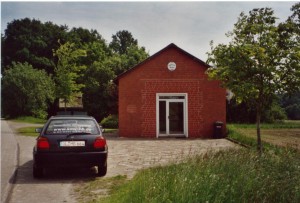 farmed over the years, but I do know that the farm was large enough to need its own Firehouse. I also know over the centuries, the buildings have been so well kept that they are still in use today, and look fantastic.
farmed over the years, but I do know that the farm was large enough to need its own Firehouse. I also know over the centuries, the buildings have been so well kept that they are still in use today, and look fantastic.
It is very strange to think about the fact that over the years, many of our family’s Schulenberg ancestors have lived in those buildings, and worked in those fields. The farm has a large barn and a garage for the farm equipment, as well as a bakery, which I found strange, but I’m sure it was necessary at that time. My guess would also be that there were a number of servants and hired hands over the centuries, so the bakery was probably very busy keeping the household and all the workers in bread. I have to think that the Schulenberg farm was a very large operation. I would love to have seen it 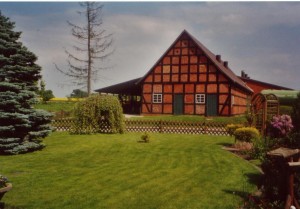 when it was in full swing back then.
when it was in full swing back then.
I don’t know if the farm is used for farming today or if it is simply a very large estate home, but it is still in beautiful condition, and I really like the traditional German design of the siding on the buildings. I also don’t know if the family that lives there now are related for sure or not, but I can say that they have a home that is filled with so much of the history of days gone by. It seems to me, that all that history would literally emanate the property, but maybe that’s just me.
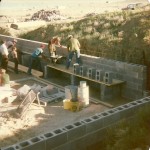 As a young wife, I found myself in the unique position of being the only person in the position to help my father-in-law during the day when he was building their home. We had moved our mobile home onto their land while we were getting our own land ready to live on. At that time, my father-in-law was leveling an area of land so that he could build the home he planned to build on it. His way of leveling the land was to have me drive the tractor…something I had never done before…while pulling a scoop, guided by him behind it. My first worry was that I would go too fast and end up dragging him behind the tractor. He reassured me that it would be ok, and I knew he needed me to be there for him, so with a pain in the pit of my stomach, I set out. There were a few jerky movements, but in no time, I got the hang of it, and found that we worked well together. It was an experience that I will never forget…for a city girl, who had never driven a tractor, it was…well, amazing!
As a young wife, I found myself in the unique position of being the only person in the position to help my father-in-law during the day when he was building their home. We had moved our mobile home onto their land while we were getting our own land ready to live on. At that time, my father-in-law was leveling an area of land so that he could build the home he planned to build on it. His way of leveling the land was to have me drive the tractor…something I had never done before…while pulling a scoop, guided by him behind it. My first worry was that I would go too fast and end up dragging him behind the tractor. He reassured me that it would be ok, and I knew he needed me to be there for him, so with a pain in the pit of my stomach, I set out. There were a few jerky movements, but in no time, I got the hang of it, and found that we worked well together. It was an experience that I will never forget…for a city girl, who had never driven a tractor, it was…well, amazing!
As I was scanning pictures from my Uncle Bill’s lifelong accounting of our family history, I came across something that made my experience look like learning to ride a bicycle. My Great Aunt Bertha, my Grandpa Spencer’s sister, was raised by a family named Hoover. I don’t know all the reasons behind that situation, but Uncle Bill simply states that she and her mother could not get along. The Hoover family used a steam tractor, and Great Aunt Bertha learned to operate them very well. Today, that might not seem like something so awfully special, but that was back in about 1910, and the girls didn’t do that kind of work much. Nevertheless, there were then, as there are now, people go beyond the normal expectations to do the extraordinary. Great Aunt Bertha was one of those people. She was well known for her ability to operate the steam tractor…so well known, in fact that in 1956, while attending an antique tractor and thresher show, one of the old timers, who 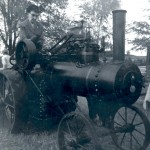 knew Great Aunt Bertha, offered to let her take the steam tractor for one last spin.
knew Great Aunt Bertha, offered to let her take the steam tractor for one last spin.
He didn’t have to offer twice. Great Aunt Bertha jumped at the chance to drive that incredible machine one more time. She got on and drove it like she had never been away from the farm. I suppose that it is like a bicycle in that way. Once you have learned to operate it, you never really forget. So here was Great Aunt Bertha driving around on that old steam tractor again in the year 1956, at the age of 61 years. I would have loved to be there to see that. There were likely men there who would not have been able to run that machine, and here was this little old girl, driving it like she was born there. Amazing!!

 In 1910 – 1911, my Grandpa Spencer and my grandma’s brother, my Uncle Albert Schumacher, spent the winter months trapping and working in the logging camps in northern Minnesota. This was before my grandparents were married. The men took several pictures before embarking on the journey from the Schumacher farm in Elliot, North Dakota in September 1910 for their “winter in the woods”. My grandpa took his 1895 Winchester 30-03, the gun that was his pride and joy, and Uncle Albert had a 1899 Savage and they headed off on their adventure. It would be a winter to remember. It was freezing cold, often getting down to 30° below zero.
In 1910 – 1911, my Grandpa Spencer and my grandma’s brother, my Uncle Albert Schumacher, spent the winter months trapping and working in the logging camps in northern Minnesota. This was before my grandparents were married. The men took several pictures before embarking on the journey from the Schumacher farm in Elliot, North Dakota in September 1910 for their “winter in the woods”. My grandpa took his 1895 Winchester 30-03, the gun that was his pride and joy, and Uncle Albert had a 1899 Savage and they headed off on their adventure. It would be a winter to remember. It was freezing cold, often getting down to 30° below zero.
They built what they called a flat boat to carry their supplies, two rifles, two handguns, plenty of ammunition, and plenty of dried and canned food. The boat could also be loaded onto a wagon when they needed to travel across country, although, I’m not sure where they got the wagon after traveling by water. Still since I have seen the picture with the boat on the wagon, I know that they got that part covered as well. In the end, the cold winter sort of won out. They trapped during October and November and then worked in the logging camps until spring.
While the cold winter, and the freezing conditions did change their plans for the winter, you could still say that they had a successful winter of trapping anyway. Now, I don’t know how I would feel about trapping skunk, because at some point you have to go and deal with that carcass, and to me that would be horrible. We have all driven by a spot where a skunk was killed, and…whew, what a smell!! Nevertheless, my grandpa and my uncle took that in stride and came away with a good amount of skunk and muskrat pelts for their efforts. My Uncle Bill, who I must credit for the information in this story, figured that in all, 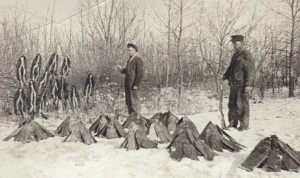
 they probably made about $100.00 for that cold winter’s trapping venture, plus the money earned while working in the logging camps. It may not sound like much money for all that work and the freezing conditions, but in 1910 and 1911, it was a pretty decent wage.
they probably made about $100.00 for that cold winter’s trapping venture, plus the money earned while working in the logging camps. It may not sound like much money for all that work and the freezing conditions, but in 1910 and 1911, it was a pretty decent wage.

